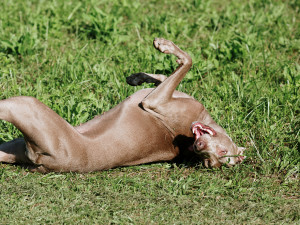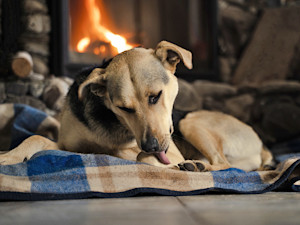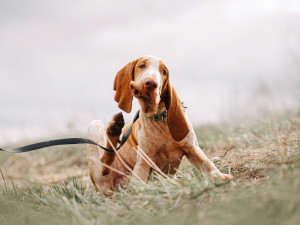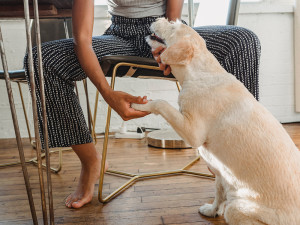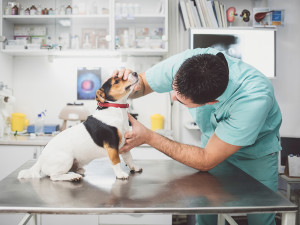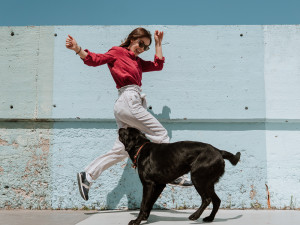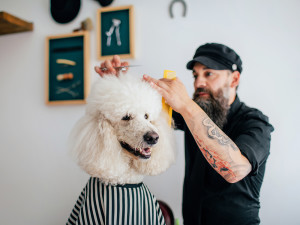Why Do Dogs Lick Their Paws?
Their toes might smell like Fritos, but there’s no way they taste that good.

Share Article
In This Article:
Why Do Dogs Lick in the First Place? Common Causes for Paw Licking Signs It’s Time to Take Your Dog to the Vet for Obsessive Paw Licking How to Prevent Paw Licking Frequently Asked Questions
“Finger-lickin’ good” might be KFC’s slogan, but it’s definitely not the best use of manners. When your dog licks their paws, though, the issue could be something more serious than bad manners. Although paw licking is a common behavior in pups and sometimes a basic part of grooming, a history of excessive licking could be a big red flag for their health. Plus, constant licking can also cause a secondary infection (bacterial or yeast) because of the extra paw moisture.

So, why do dogs lick in the first place?
Dogs are known to lick themselves; it’s no secret. Let’s start with the most basic behavior: self-grooming. You’ve probably noticed your dog licking their paws before a snooze on the sofa, and that’s completely normal. When this behavior intensifies, that’s a problem, and the cause is often environmental.
“The most common cause of paw licking is generally environmental allergies, also called atopic dermatitis,” Dr. Flynn says. “Other causes of licking paws can include ectopic parasites such as fleas or mites, referred pain from arthritis — licking the feet or limbs since they can’t reach the painful joint.”
The good news here is that many of the causes of a dog’s paw-licking can be resolved at home, and those that can’t often are treatable with the help of allergy medications prescribed by your vet.
Common causes for paw licking
Normal grooming behavior
While cats hold the crown in the self-grooming kingdom, dogs typically aren’t far behind. Even though dogs are known to get muddy and roll in things that smell less than fresh, most of them do like to stay clean. Licking their paws may be their normal way of doing a little self-care and self-cleaning. You may notice they lick their paws when they first come inside or when they’re settling for a nap. Both could be ways of getting things in order, and since many people think that dog feet smell like Fritos, who can blame them?
Environmental allergies
For environmental allergies, increased ear-scratching and foot-licking are common reactions to things like grass and plant pollens, mold spores, and dust mites. If you find your dog licking excessively and more frequently after trips to the park or a walk around the block, they may have an environmental allergy.
“Fortunately, [there are] excellent treatment options for this, but an easy first step is to rinse the pollens and other allergens off the feet. This can also help remove bacteria and yeast, which can be involved in secondary infections,” Dr. Flynn notes. Symptoms of environmental allergies in dogs can include itchy skin and ears, paw licking, rashes, and sometimes running eyes.
Flea allergies
When a dog’s immune system overreacts to flea saliva, it’s called flea allergy dermatitis (FAD). This allergic reaction causes an irritation in the skin, which usually results in an extremely itchy sensation for the poor pup. Dogs will typically scratch and lick their paws and rump in an attempt to soothe the itch caused by flea allergies. Fur loss, thickened skin, redness, and hot spots are common symptoms indicative of flea allergy dermatitis.
Food allergies
Food allergies occur when your dog’s immune system overreacts to something (a protein or complex carbohydrate) in the ingested food. An important note is that a food allergy differs from a food sensitivity in that allergies will cause an immune reaction versus just digestive irritation.
“Food allergies are rare in dogs and generally manifest as itching rather than facial swelling as we see in people,” Dr. Flynn adds. The most common foods that cause allergies in dogs include beef, dairy, wheat, egg, and chicken. Your vet can help you check your pup’s food and treats for ingredients that might be irritating them. Symptoms to watch out for include itchy skin, chewing, hot spots, diarrhea, and vomiting.
Dry skin
Dry skin can become irritated, cracked, and flaky (dandruff). Dry skin can be caused by many things, including excessive bathing, which removes a dog’s natural oils, dry humidity, or the allergies mentioned above. It’s important to follow a good grooming schedule to ensure your dog’s coat stays healthy. If your dog has dry skin, you may notice overall itchiness, redness, and dandruff.
Injury
Another potential cause for a dog’s excessive licking is an injury to the paw itself. In the summer, pet parents should watch out for more than just allergies as a potential culprit.
“There are also seasonal causes of paw licking such as a blown pad — where the surface is blistered or abraded off — caused by a dog running on hot asphalt or a rough surface like a tennis court,” Dr. Flynn says. “And in the winter, road salt can be very irritating and cause dogs to lick their paws.” While uncommon, Dr. Flynn notes there are more serious causes for concern when it comes to paw chewing, including deep soft tissue infections, toe fractures, nail bed disease, auto-immune disease and in rare cases even cancer.
Obsessive and anxious behavior
It’s important to rule out any medical conditions before looking at behavioral issues, Dr. Flynn cautions. Dogs, like people, often seek ways to comfort themselves in times of stress.
“This behavior can be a form of self-soothing for pain, or in some cases anxiety,” Dr. Flynn says. Is there a change in environment (noises, routine, new pets, or people) that might cause your dog to seek this form of stress relief? In addition to stress, some dogs have canine compulsive disorder, which is a form of OCD. Common compulsive behaviors for dogs with CCD include paw licking, toy/blanket sucking, tail licking, and tail chasing. Try to identify the causes of your dog’s stressful and anxious behavior and use redirection and exercise to relieve it.
Boredom
While any breed can be overcome by boredom, it most typically affects working breeds, including but not limited to: German Shepherds, German Shorthaired Pointers, Golden Retrievers, Great Danes, Irish Setters, Labrador Retrievers, and Pointers. When boredom sets in, a dog may simply distract themself by licking when searching for something to do.
Parasites
We mentioned fleas earlier, but they aren’t the only creepy-crawlies that can irritate your dog. Ticks, mites, or lice can also cause skin irritation that may lead to your dog licking their paws. Along with that, you may also notice your dog licking or scratching other parts of their body along with hair loss, redness, or sores on their skin.
Foreign objects
A dog’s paw pads are tough and thick, but they aren’t indestructible, and neither is the skin above the paw pads or between a dog’s toes. Tiny things like thistle stickers, thorns, and grass seeds can find their way into your dog’s feet, where they can become quite an irritation. Dogs may lick at their paws as a way to soothe or help remove the source of the irritation. You may notice red spots, swelling, or even wounds if there is a foreign object.
Arthritis
Dogs have nearly 20 bones in their front feet and around 15 in their hind feet. Couple that with even more teeny tiny bones in their wrists and ankles, and you’re left with a number of joints that could potentially become arthritic. Arthritis creates a lot of inflammation and pain which a dog may try to soothe by licking. Arthritis may also cause stiffness, not wanting to walk, and swelling of the feet.
Infections
The skin is an organ specially designed to protect the inner workings of the body, among other things, and it does a pretty good job at it. But there are times when the skin can become damaged or overwhelmed with bacteria or fungus, and your pup can get an infection. Skin infections thrive in dark and moist environments, such as between the toes or foot pads and can really bloom into an ugly flower of redness, irritation, and oozing or flakiness.
Autoimmune diseases
Autoimmune diseases are when a dog’s immune system goes haywire and starts to attack the body rather than protect it. There are many types of autoimmune diseasesopens in new tab in dogs, which are fortunately not common, and some of them can show up as skin lesions as well as paw licking in dogs. Any unexplained skin issues should be checked by a vet.
Signs it’s time to take your dog to the vet for obsessive paw-licking
Every dog is going to lick their paws from time to time and these little moments are typically nothing to worry about. But if your dog’s paw-licking has become more of an obsession than a quick clean up lick, it’s likely time to see your veterinarian.
This is especially true if your dog’s paw-licking has created an ugly mess out of their feet. Any redness, swelling, hair loss, or bumps should be checked out sooner rather than later.
Treatments for paw-licking
Your veterinarian is going to need some help from you with this one. They’ll want to know when it started, what triggers it, and any other signs your dog may be showing. They will take it from there with an exam that may include taking some samples to be more closely looked at. X-rays and bloodwork may also be necessary.
Treatments may include medications for allergies, infections, and parasites, removal of foreign objects, and lifestyle changes for allergies, arthritis, and behavioral issues. Basically, the treatment includes r emoving the cause of the irritation, then getting the skin to heal.
How to prevent paw-licking
Hot spots, lick dermatitis, bacterial infections, and yeast infections are secondary causes of concern with excessive paw-licking. Check your dog’s paw pads, in between their toes, and along their legs for anything which might be causing irritation. If you think your dog is licking or chewing too much, it’s essential you prevent further licking and reach out to your veterinarian for an evaluation.
“A dog will make a mountain out of a molehill and can do a lot of damage in a short amount of time,” Dr. Flynn cautions. “Rinsing the foot with lukewarm water then drying it thoroughly may help make the area more comfortable in the meantime.” While you are waiting to be seen by your vet, consider getting an e-collar (cone) or basket muzzle to prevent injury.
You know your dog better than anyone else. To help identify an abnormal situation, you must first know what is normal. Changes in health are often subtle or happen over a long time, making noticing a problem more difficult. So, pay attention to your dog’s normal behavior.
Final thoughts: Why do dogs lick their paws?
Paw licking in dogs can stem from a variety of causes, a few of which are normal and some of which can indicate something serious.
If your pup is licking their paws, start by giving everything a look over, checking the skin, paw pads, between the toes and by feeling the joints. You can try rinsing your dog’s feet with warm water to remove irritants and prevent them from licking by using a cone or light bandage.
If your dog’s paw licking has become obsessive or if they are creating more damage to their feet, check in with your veterinarian.
Obsessive and anxious behavior
It’s important to rule out any medical conditions before looking at behavioral issues, Dr. Flynn cautions. Dogs, like people, often seek ways to comfort themselves in times of stress. “This behavior can be a form of self-soothing for pain, or in some cases anxiety,” Dr. Flynn says.
Is there a change in environment (noises, routine, new pets, or people) that might cause your dog to seek this form of stress relief? In addition to stress, some dogs have canine compulsive disorder, which is a form of OCD. Common compulsive behaviors for dogs with CCD include paw licking, toy/blanket sucking, tail licking, and tail chasing. Try to identify the causes of your dog’s stressful and anxious behavior and use redirection and exercise to relieve it.
Boredom
While any breed can be overcome by boredom, it most typically affects working breeds, including but not limited to: German Shepherds, German Shorthaired Pointers, Golden Retrievers, Great Danes, Irish Setters, Labrador Retrievers, and Pointers. When boredom sets in, a dog may simply distract themself by licking when searching for something to do.
FAQs
How do you groom your dog’s paw?
Dogs need their nails trimmed on a regular basis. This helps prevent overgrown nails and breakages that can be painful. You’ll also want to check your dog’s feet, especially after being outside in extreme temperatures. Lightly washing their paws with warm water can help remove irritants, debris and other things that could create problems. Trim the hair between a dog’s toes, if long, to prevent snowballs and debris from packing in there as well.
What can I give my dog for paw licking?
Before treating your dog’s paw licking, you’ll want to find out what’s causing it. This may take a trip to the vet. Otherwise, you can start by washing their feet with lukewarm water and thoroughly drying them. Don’t apply any ointments or medications unless instructed by your vet.
Why is my dog licking their front legs so much?
Because the legs are an extension of the feet, any of the above causes could apply to licking the front legs. If this is something new your dog is trying, consider seeing a vet to pin down the cause.
When should I be concerned about my dog licking their paws?
Licking themselves is a normal behavior for dogs, but it’s not one you’ll want to see them take to the extreme. If their paw licking has become more frequent than not or if they are causing damage to their skin, it’s time to see a vet.
References
“Canine Skin Autoimmune Diseases.” Cornell University College of Veterinary Medicine, 2024, www.vet.cornell.edu/departments-centers-and-institutes/riney-canine-health-center/canine-health-information/canine-skin-autoimmune-diseasesopens in new tab.

Daniela Lopez
Daniela Lopez is a digital media specialist and long-time contributor to The Bark.

Dr. Chyrle Bonk, DVM
Dr. Chyrle Bonk has been a mixed-animal veterinarian since 2010, with a special interest in rehabilitation. When she's not practicing or writing about veterinary medicine, you may find her exploring the outdoors with her family or tending to her cows, horses, chickens, or cats and dogs.
Related articles
![puppy scratching fleas, get rid of fleas on dogs]()
How to Get Rid of Fleas — Proven Home Remedies
You can stop your home from becoming a literal flea circus.
![A woman sitting in a chair holding a dogs paw in her hand and holding the dogs face in the other hand.]()
6 Natural Paw Balms That Will Keep Your Pup Safe From Summer Heat
The best paw balms, based on veterinarian recommendations.
![Basset hound dog in hands of owner sitting outdoor playing with his large ears holding spread in hand]()
A Pain in the Ear: What to Know About Dog Ear Infections
Dogs are especially at risk for ear infections. Here’s what to look out for.
![A vet examining the neck of a small dog on the examination table]()
Lymphoma Cancer in Dogs: What You Need to Know
Find out what causes lymphoma in dogs and how you can help your pup.
![Cheerful Brunette Having Fun With Her Dog Outside]()
Big Fish: The Best Omega-3 Supplements for Dogs (And Why They Need Them)
Fatty acids rev up your dog’s energy, keep their coat shiny, help with inflammation from allergies and arthritis, and so much more.
![a large fluffy white Poodle dog being groomed]()
Study Shows Pro Grooming Is Better at Curbing Dog Itching Than DIY
Data collected by The Pet Insight Project proves our kitchen sink salons aren’t quite cutting it.

